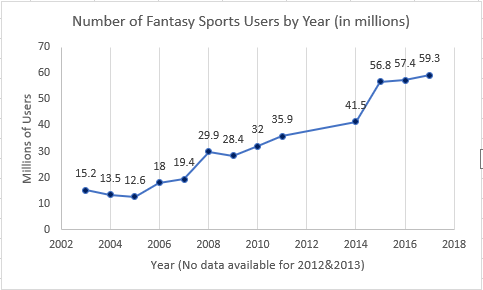
By: Alexis Lilly
The legalization of sports betting altered fantasy sports in an unprecedented way.[1] New Jersey, one of the first states to enact legislation to legalize sports betting, saw close to $100 million in total wagers during August 2018 alone.[2] With this new development, fantasy sports and fantasy sports betting also changed.[3] Fans now have the option to bet on every single play, with daily fantasy sports also rising in popularity.[4]
Professional athletes, much like states, have much to gain with this new legislation.[5] On October 24, 2018, the Indiana Supreme Court decided Daniels v. FanDuel,[6]holding that the First Amendment outweighed an athlete’s publicity rights claim in fantasy sports.[7] This case, the first one decided after the landmark Murphy decision, was brought by former college athletes who sued FanDuel and DraftKings, prominent sports betting platforms.[8] Indiana’s right of publicity statute, § 32-36-1-1, allows for a right of publicity except, among others, in material that is newsworthy or political.[9]
In Daniels, the plaintiffs alleged that the sports betting site violated their publicity rights under Indiana law by not compensating the athletes for use of their name, likeness, and game statistics in fantasy sports.[10] Defendants counterargued that the First Amendment allowed them to use this data without compensation to the plaintiffs.[11] Ultimately siding with the defendants, the court ruled that because the athletes were in the public domain, FanDuel and DraftKings did not need to compensate the players for use of their name.[12] This information was in the public sphere, and therefore the First Amendment allowed the platforms to use it without violating the statute.[13] The court reasoned that the claim fell within the “newsworthy exception” to the statute because the athlete’s name and game data is of general value to the public.[14] While the statute doesn’t directly define what is newsworthy, the court interpreted the meaning broadly.[15] They court analogized the use of this information in fantasy sports to statistics printed in a local newspaper.[16]
This decision has widespread impact
on athletes and the right of publicity.[17] Because Indiana has one of the broadest
statutes regarding right of publicity, other courts are likely to defer to
their reasoning if similar cases are brought before them.[18] Athletes are not without recourse. One solution is to bargain with sports
betting platforms, like FanDuel and DraftKings, to enforce this right.[19] Players may be able to track their data
during practices, and then use this data to sell to betting companies.[20] While some athletes may have privacy
concerns, this data may be helpful for them to improve their performance.[21] Fantasy sports platforms are also interested
in this data because it allows them to update their odds for play-by-play
betting to make them more accurate.[22] Regardless of the solution, professional
athletes need to present a unified front to bargain for these rights because
the First Amendment appears to block their claims.
[1] Murphy v. Nat’l Collegiate Athletic Ass’n, 138 S. Ct. 1461 (2018) (holding the Professional and Amateur Sports Protection Act unconstitutional and allowing states to enact legislation to legalize sports betting).
[2] Eric Ramsey, New Jersey Sports Betting Generates Nearly $100 Million in August Wagers, Legal Sports Report (Sept. 12, 2018, 11:43 AM), https://www.legalsportsreport.com/24005/new-jersey-sports-betting-august-revenue/ (highlighting online and mobile betting contributed more than a third of the total revenue for sportsbooks).
[3] Irwin Raij et al., Legalized Sports Gambling: Revenue Opportunities Following Murphy, O’Melveny & Myers (Aug. 13, 2018), https://www.omm.com/resources/alerts-and-publications/alerts/client-alert-legalized-sports-gambling-revenue-opportunities-following-murphy/#.
[4] Harold Stark, What Is Daily Fantasy Sports and Why Is Everyone So Obsessed with It?, Forbes (Dec. 9, 2017), https://www.forbes.com/sites/haroldstark/2017/12/09/what-is-daily-fantasy-sports-and-why-is-everyone-so-obsessed-with-it/#458782e1be3a.
[5] Raij, supra note 3.
[6] 109 N.E.3d 390, 398 (2018).
[7] Id. at 390.
[8] Id.
[9] Ind. Code § 32-36-1-7 (2018).
[10] Daniels, 390 N.E.3d at 392.
[11] Id. at 396.
[12] Id. at 396, 398.
[13] Id. at 396.
[14] Id. at 394.
[15] Id. (finding the term was meant to be construed broadly because there is a presumption the legislature will not enact laws that conflict with common law).
[16] Id. at 396.
[17] Raji, supra note 3.
[18] Christina Costa & Jonathan Polak, Indiana Supreme Court: No Right to Publicity in Fantasy Sports, Taft (Oct. 26, 2018), https://www.taftlaw.com/news-events/law-bulletins/indiana-supreme-court-no-right-to-publicity-in-fantasy-sports (speculating this decision may not be limited to Indiana and “is likely to be instructive, guiding and potentially dispositive”).
[19] See Thomas Dunn, NFL Players Need to Gain Leverage in Contract Negotiations, Vill. U. Jeffrey S. Moorad Ctr. for Study Sports L., https://www1.villanova.edu/villanova/law/academics/sportslaw/commentary/sls_blog/2018/nfl-players-need-to-gain-leverage-in-contract-negotiations.html. (highlighting the unfairness players suffer as a result of disproportionate bargaining power).
[20] Matt Rybaltowski, NHL’s Historic Deal with MGM Resorts Completes Gary Bettman’s U-Turn on Sports Betting, Forbes (Oct. 29, 2018, 5:53 PM), https://www.forbes.com/sites/mattrybaltowski/2018/10/29/nhls-historic-deal-with-mgm-resorts-completes-gary-bettmans-u-turn-on-sports-betting/#25a8edb85aca.
[21] Paul Steinbach, Tracking Technology Revolutionizes Athlete Training, Athletic Bus. (Sept. 2013), https://www.athleticbusiness.com/equipment/tracking-technology-revolutionizes-athlete-training.html.
[22] Dave Issac, Flyers Don’t Mind NHL’s Sports Betting Partnership with One Possible Exception, Courier Post (Oct. 30, 2018, 4:54 PM), https://www.courierpostonline.com/story/sports/nhl/flyers/2018/10/30/flyers-ok-sports-betting-partnership-one-possible-exception/1824114002/.

